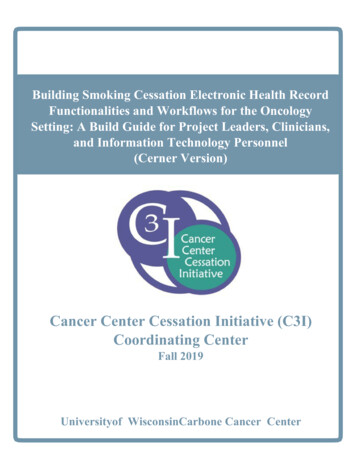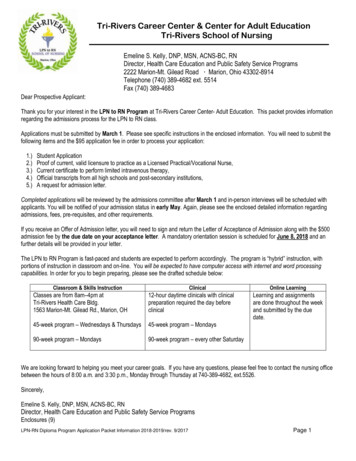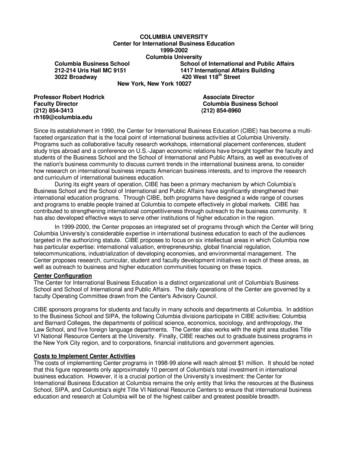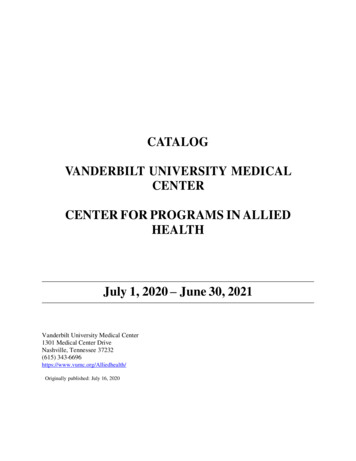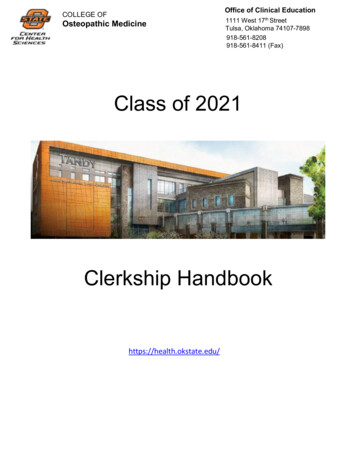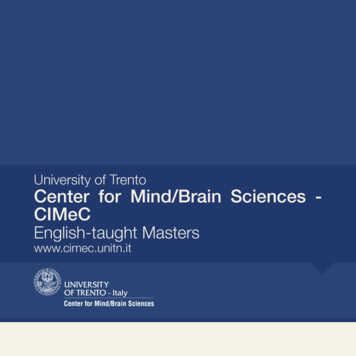
Transcription
University of TrentoCenter for Mind/Brain Sciences CIMeCEnglish-taught Masterswww.cimec.unitn.itCenter for Mind/Brain Sciences
The Center for Mind/Brain Sciences - CIMeCThe Center for Mind/Brain Sciences (CIMeC) is an international research institute specialized in mind andbrain studies. Its strengths are research, training, instrumentation and dissemination of knowledge within thelocal community. CIMeC is one of the leading Cognitive Neuroscience research units in Italy (ranked 1st inItaly for Quality of Research 2013) whose faculty has won several highly competitive national and internationalgrants. CIMeC researchers study brain organization via the analysis of its functional, structural and physiologicalcharacteristics, in both normal and pathological conditions. Top-of the line instrumentation includes fMRI, MEG,EEG, NIRS, TMS, tDCS and eye tracking solutions, as well as systems for studying kinematics.The Center is responsible for graduate training programs at both Master’s and Doctorate levels placing a heavyemphasis on professional development and successful placement of graduates. The activities organized byCIMeC are diverse and numerous, including colloquia, research seminars, international workshops with leadingresearchers in the mind/brain sciences as invited speakers. The close integration of the Center’s core scientific,educational, and clinical programs fosters a dynamic multidisciplinary environment for research in cognitiveneuroscience.Research at CIMeC is conducted in various areas that range from experimental psychology, to neuroimagingacquisition methods, cognitive neurosciences and animal cognition, as well as computational linguistics. Inaddition, the Center for Neurorehabilitation (CeRiN) is dedicated to the diagnosis and treatment of pathologiesderiving from cerebral damage. CIMeC maintains strong ties with other groups at the University of Trento,including researchers in the Departments of Psychology and Cognitive Science, Physics, and Information andCommunication Technology. Research is conducted in five interdisciplinary labs: Functional Neuroimaging (LNiF) Experimental Psychology (EPL) Neuropsychology (NP) Center of Neurocognitive Rehabilitation (CeRiN) Language, Interaction and Computation (CLIC) Animal Cognition and Comparative Neuroscience (ACN).The Laboratory of Neurophysics (NPhys) is a joint activity of CIMeC and the Department of Physics. Five externallabs have become part of CIMeC: Computational Cognition (CCL) and NeuroInformatics (NILab) in collaboration with the Bruno KesslerFoundation Insect Neurobiology and Neuroecology laboratory (INN Lab) in collaboration with the Research and InnovationCentre of the Edmund Mach Foundation Ethology, Ecology and Evolution (EEE Lab) in collaboration with the Public Museum of Rovereto.
Living in RoveretoCIMeC is located in Trentino at the foot of the Dolomites, a UNESCO world heritage site. The teaching andexperimental labs are in Rovereto (30 km south of Trento), and the Neuroimaging facilities are near Trento.Trento is set at the intersection of important routes leading to Lake Garda, the Dolomites, Venice, Verona, Bolzanoand Innsbruck. It is dominated by the nearby Bondone and Paganella mountains, where residents and touristsgo skiing and hiking. Trento is able to surprise as it is a very versatile city, constantly changing features, yetalways maintaining close links with tradition. Despite being small (115,000 inhabitants), nowadays Trento is stillan important crossroad between the Mediterranean and the Alpine areas and a culturally active city. Trento’s richartistic and historical heritage can be found in its monuments, which embody centuries of history written underthe dual influences of northern and Italian cultures, still evident today in the variety of architectural styles. Trentoand its region offer a wide range of cultural events at any time of the year: exhibitions, cultural meetings at severalprestigious museums, festivals, musical and theatre seasons, as well as the chance to taste local wines andcuisine. Students can enjoy its several facets throughout the year: taste local gastronomic products in autumn,experience history and local tradition during the San Vigilio Festival, at the end of June, or visit the Christmasmarket in December. All of this makes Trento one of Italy’s most pleasant cities to live in.With nearly 33,000 residents, Rovereto is a dynamic and culturally rich town offering internationally renownedevents, art and sports exhibitions. Adding to the already world-wide known Peace Bell, the austere VenetoCastle which hosts the Historical War Museum, and the traces of its Venetian past in its historical center, is theMart museum, the Museum of Modern and Contemporary Art in Trento and Rovereto, designed by architectMario Botta, which has placed the city among the art capitals of Europe once again. The Mart and the oldesttheater in the region, the Zandonai theater, built in 1782, decorate Corso Bettini amongst other buildings from the1700s. This is where the academic and research centers of the University of Trento are located, which contributeto highlight the cultural aspects that marked the life of Rovereto in the Eighteenth century. Depending on theseason, many cultural and artistic events take place here, as well as in the surrounding areas, like the LagarinaJazz Festival, historical reenactments in the city of Ala (a few kilometers south of Rovereto), the Comun Comunale(organized by the villages on the right side of the Adige River) and the autumn Ganzega. If you are keen on sports,you have a very wide range of possibilities to choose among mountain climbing, trekking, canoeing, rafting,mountain biking, horse-riding, skiing, ice skating, speleology, fishing, windsurfing, sailing, tennis, etc.
Master’s course in Cognitive ScienceThe Master’s course in Cognitive Science leads to the Master’s degree in Cognitive Science (Laurea Magistrale),whose aim is to provide students with advanced theoretical and methodological knowledge in cognitive neurosciencethrough an interdisciplinary approach to the study of the mind-brain system. Two characteristic features of thisprogram are: a close relationship between teaching and research practices, and a constant interplay betweenbiology-based and technology-based explorations of the human mind and brain.The program combines courses in cognitive neuroscience, statistics, advanced signal and data analysis withhands-on training in cutting-edge research techniques. The program provides research-focused training witha varied, international group of faculty and researchers. All students are actively involved in developing researchprojects and have access to the laboratories during the Master’s course, thus gaining invaluable hands-onexperience with the latest research technologies. These include functional magnetic resonance imaging (fMRI),transcranial magnetic stimulation (TMS), magnetic encephalography (MEG), transcranial direct current stimulation(tDCS), electroencephalography (EEG), eye tracking, cinematic motion tracking, psychophysics, computationalmodeling, & comparative cognition (animal models). The knowledge and skills gained during the Master’s coursewill most of all provide a foundation for advanced scientific research, but also prepare for professional applicationsin more applied settings.Program overviewMain application deadlineNon-EU: January/February each yearExtended applicationdeadlineJune each year, only for EU citizens or non-EU citizens living in Italy(check www.mcs.unitn.it for updates)IntakeSeptember each yearDuration2 years, full timeMinimum requirementsBachelor’s degree, fluency in English, basic knowledge of programming,mathematics and statisticsSelection criteriaCurriculum Vitae et Studiorum, English knowledge, professional experience inuniversity or research, referencesCareer opportunitiesThe Master’s course in Cognitive Science offers a unique opportunity for students aiming to train as scientists. Itsmain objective is to prepare talented doctoral candidates who can be competitive and confident in performingresearch in international settings. Graduates will be able to apply advanced skills in cognitive neuroscience usingexperimental methodologies in the study of the mind-brain system. They will conduct research activities as partof the analysis and development of systems related to human cognitive performance as well as empirical researchand development of neural and computational models of cognition.
The Master’s course in Cognitive Science is international: our students come from all continents and, aftergraduation, find positions in their home countries and elsewhere. Though the program is relatively young, itsstrength is already evident in the satisfaction reported by students and in their high and successful placementafter graduation. A recent survey conducted on 84 graduates of the program showed that 77% of them arecurrently employed. The Master’s degree in Cognitive Science provides access to doctoral courses in thedisciplines of cognitive neuroscience, both in Italy and in Europe as well as in the United States. CIMeC itself offersa PhD program in Cognitive and Brain Sciences. We are also very proud of the success of those students whochoose careers in industry. They have found interesting positions in academic research management (both clinicaland non-clinical), software development, communication and consulting.RequirementsIdeal applicants are highly motivated individuals holding a Bachelor’s degree from an accredited university, andfluent in English. Students whose first language is not English, or whose language of instruction in the previousdegree was not English, are asked to provide evidence of a good command of English. Candidates will be selectedon the basis of their academic achievements, strength of their intellectual and working abilities as described in theirCV, their experience in the field, and reference letters. We are open to candidates from any academic background.Fees and FundingThe yearly tuition fee is approximately 3,000 euro for European students and 6,000 euro for non-Europeanstudents: the fee may be reduced depending on the student’s financial situation. Qualified candidates areencouraged to apply for scholarships. The Opera Universitaria scholarship is awarded on the basis of incomeand merit, and covers partial or total living expenses. Each year scholarships and tuition waivers will be madeavailable depending on the financial sources available.Joint Study ProgramsThe course is also part of a joint educational program, restricted to a small number of highly selected students,with the Scuola Internazionale Superiore di Studi Avanzati di Trieste (SISSA).Another opportunity is offered by the European Master’s Program in Language and CommunicationTechnologies (EM LCT), a joint international study course recognized by the European Commission under theErasmus Mundus program. We also offer students the opportunity to attend courses abroad as part of internationalexchange programs and numerous collaborations with foreign universities.
ART UniTrentoIMG Archivio UniTrento (A. Coser, fototonina.com)PRINTED October 2016
ContactsCIMeC - Center for Mind/Brain SciencesPalazzo Fedrigotticorso Bettini, 31 - 38068 Rovereto (TN), Italyphone: 39 0464 808615mcs@unitn.itinternational.unitn.it/mcs
The Center is responsible for graduate training programs at both Master’s and Doctorate levels placing a heavy . The Laboratory of Neurophysics (NPhys) is a joint activity of CIMeC and the Department of Physics. . exchange programs



